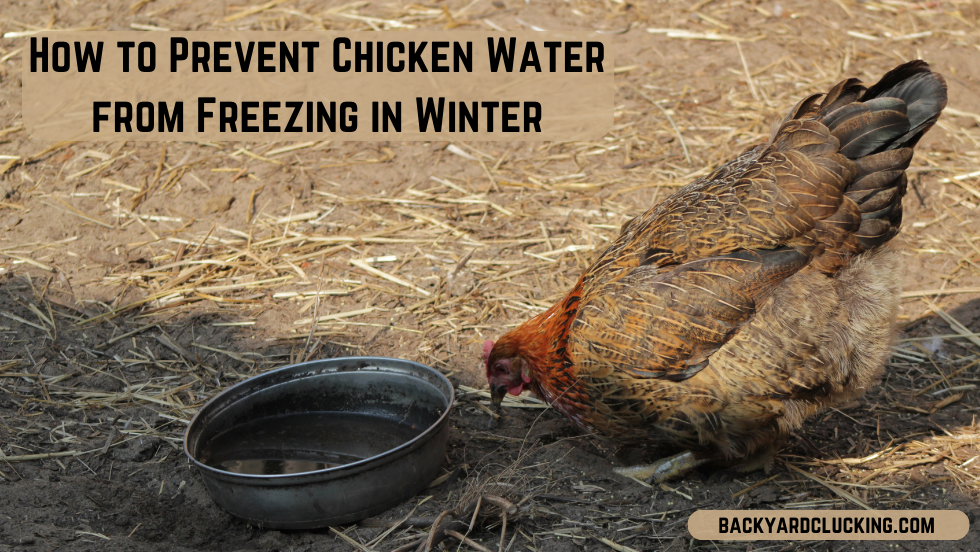As a poultry farmer, I understand winter’s challenges, especially when keeping your chicken’s water from freezing. It is essential to provide free and constant access to water during these cold months. This guide will provide effective strategies you can use regardless of your experience level.
Causes and Effects of Frozen Water
The primary reason for water freezing in the winter is due to the low ambient temperatures. This can lead to various complications for your chickens:
- Dehydration: Even in winter, chickens need access to water to maintain their body functions. When water freezes, it reduces or stops their drinking ability, leading to dehydration.
- Reduced egg production: Water is a vital component in egg production. A lack of water supply can result in a decline in egg production.
- Increased risk of frostbite: Access to water is necessary for maintaining body temperature and frostbite prevention.
Recommendations & Practical Tips for Preventing Water Freezing
Here are some product recommendations and tips to keep your chicken’s water from freezing during winter:
- Insulated containers: Select insulated water containers or use a layer of insulation (e.g., foam) to help retain the warmth and slow the freezing process.
- Heated waterers: Invest in heated poultry waterers or electric heaters explicitly made to remain submerged in water. These are safe and energy-efficient options.
- Multiple water sources: Ensure you have multiple water sources for your chickens. This precaution helps in case one or more water sources freeze.
- Frequent water refilling: Refill water containers with warm water two to three times a day. This practice provides your chickens with fresh water while reducing the chance of freezing.
- Choose the right location: Place the water sources in a sheltered area away from cold drafts but in a well-lit location. Sunlight can help warm the water during daylight hours.
- Insulate the coop: Make sure the coop is well-insulated to minimize drafts and keep the surrounding temperature warmer.
- Ensure adequate ventilation: Proper ventilation promotes moisture control and reduces the likelihood of freezing.
What to Do if the Water Freezes
- Break the ice: Use a tool or your hand to break the ice and create a temporary water source until you can refill it with warm water.
- Warm containers: If the water is frozen solid, bring them indoors, let them thaw, fill them with warm water, and return them to the coop.
- Frequent checks: During extreme weather, check water sources more frequently and replace frozen water with fresh, warm water.
By following these guidelines and recommendations, you can effectively manage your poultry farm during winter and ensure your chickens have constant access to water. Remember always to prioritize safety and the welfare of your chickens, and you will enjoy happy and productive flocks regardless of the season.
Frequently Asked Question
Is warm water good for chickens in winter?
As with all living beings, chickens require water for their survival. It is crucial to always provide them with fresh and clean water, even in freezing conditions. Although chickens prefer cool water over warm water, they will not attempt to break through a layer of ice to access the water underneath.
Do chickens prefer warm or cold water?
Chickens should have continuous access to fresh, clean, and cool water, particularly during hot summer days. If feasible, it is recommended to provide multiple water sources positioned in shaded and cool areas to promote adequate hydration. If necessary, consider incorporating ice cubes, ice blocks, or frozen water bottles to maintain the coolness of the water.
Conclusion
Providing chickens with continuous access to water is critical, especially during the winter months. With some simple steps and precautions, poultry farmers can maintain clean, plentiful, and unfrozen water sources for their chickens.
If you take proper measures and prioritize chicken welfare, your flocks should remain healthy and productive all season long!
Managing water resources for your chickens needs to be approached with care and diligence.
Utilizing the recommendations in this guide will ensure a safe and healthy winter for your poultry farm.
If you are ever unsure about managing water resources or have any other questions about your chickens’ welfare, don’t hesitate to consult a professional opinion as soon as possible. Your chickens can remain safe and content in the cold weather with proper knowledge and care.



